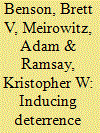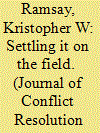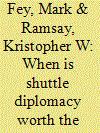|
|
|
Sort Order |
|
|
|
Items / Page
|
|
|
|
|
|
|
| Srl | Item |
| 1 |
ID:
109578


|
|
|
|
|
| Publication |
2011.
|
| Summary/Abstract |
It is well known that during a crisis, unitary rational states have an incentive to misrepresent their true resolve and willingness to go to war. This theoretical result has been taken to imply that diplomacy, interpreted as pre-bargaining communication, can have no effect on the way crises play out. This paper shows an intuitive way that diplomatic cheap talk can matter in a single crisis between countries, especially when the bargaining game has multiple equilibria. In particular, if after "diplomacy" states can choose to either fight a war directly or bargain in hopes of reaching a peaceful settlement, then it is possible to find an equilibrium, where diplomacy influences whether there is war or peace. Importantly, the cheap talk diplomacy does three things the standard model says it cannot: it coordinates actions, it reveals information, and it changes the ex ante probability of war. This result demonstrates an easy way of reconciling the discrepancy between the obvious empirical observation that diplomacy often does influence the path of a crisis with the rationalist model of war.
|
|
|
|
|
|
|
|
|
|
|
|
|
|
|
|
| 2 |
ID:
154541


|
|
|
|
|
| Summary/Abstract |
That the anarchic system generates incentives for states to balance each other's power is conventional wisdom in international relations. As such, the contemporary unipolar system is an anomaly. Observers explain its existence in several ways, including the benevolence of US hegemony and the constraints international institutions impose on the exercise of US power. None of them, however, explain what is perhaps the most puzzling outcome of the Soviet collapse: the decision of the United States to maintain its level of military spending. To explain its choice, we extend the seminal argument Waltz advanced long ago to a dynamic setting. Using a simple model, we show that the interest of the unipole in deterring a challenge to its power can induce it to continue to invest in guns rather than to shift its resources to the production of butter. This strategy can enable the incumbent unipole to pre-empt the balancing process that has long been thought to be central to state survival under anarchy.
|
|
|
|
|
|
|
|
|
|
|
|
|
|
|
|
| 3 |
ID:
128984


|
|
|
|
|
| Publication |
2014.
|
| Summary/Abstract |
Do military alliances foster aggressive behavior in allies to the point of undermining the security goal of the alliance? Like others, we find that alliance commitments may cause moral hazard because allies do not fully internalize the costs of actions that can lead to war. But unlike others, we show that the effect of moral hazard can improve security. Moral hazard can be the driving force behind generating deterrence and avoiding costly conflict. Aggressors may refrain from initiating crises if their target enjoys additional resources from its ally and so is more willing to fight back. So rather than incurring costs, moral hazard may be the very key to deterring potential aggressors and minimizing the risk of conflict. This behavior allows alliance partners to capture a "deterrence surplus," which are the gains from avoiding conflict.
|
|
|
|
|
|
|
|
|
|
|
|
|
|
|
|
| 4 |
ID:
053834


|
|
|
| 5 |
ID:
106251


|
|
|
|
|
| Publication |
2011.
|
| Summary/Abstract |
Fluctuations in the price of oil and the contemporaneous political changes in oil-producing countries have raised an important question about the link between oil rents, political institutions, and civil liberties. This article presents a simple model of the relationship between resource income and political freedom and, using an instrumental variables approach, estimates the causal effect of shocks to oil revenues on levels of democracy. Using a new data set, multiple measures of democracy, and various specifications, I find that the effect of oil price shocks is larger than might be expected and on the order of the effects found from changes in gross domestic product.
|
|
|
|
|
|
|
|
|
|
|
|
|
|
|
|
| 6 |
ID:
084028


|
|
|
|
|
| Publication |
2008.
|
| Summary/Abstract |
Using a sample of battlefield data from twentieth-century wars, the author of this article tests a number of previously untested hypotheses linking battle events and the decision to end violent conflict. The author explores how factors like the distribution of power, battlefield casualties, and information that flows from the battlefield influence war termination. The analysis speaks to the validity of competing rational choice theories of war termination.
|
|
|
|
|
|
|
|
|
|
|
|
|
|
|
|
| 7 |
ID:
100615


|
|
|
|
|
| Publication |
2010.
|
| Summary/Abstract |
The authors study the conflict mediation problem, sometimes called "shuttle diplomacy," when the mediator acts as a go-between and must gather information from the disputants. In the context of a general model of information mediation, they show that the incentive that disputants have to lie to the mediator undoes any advantage that might be gained by adding communication with a third party. In fact, the main result shows that any equilibrium outcome that is achievable through mediation is also achievable as an equilibrium outcome of a game with unmediated preplay communication. This is true even when the mediator is allowed to have arbitrary preferences or biases. The authors then test their empirical prediction on dispute management efforts between 1937 and 1985. The analysis supports the hypothesis that information mediation has no effect in environments where the mediator has no independent source of information.
|
|
|
|
|
|
|
|
|
|
|
|
|
|
|
|
|
|
|
|
|